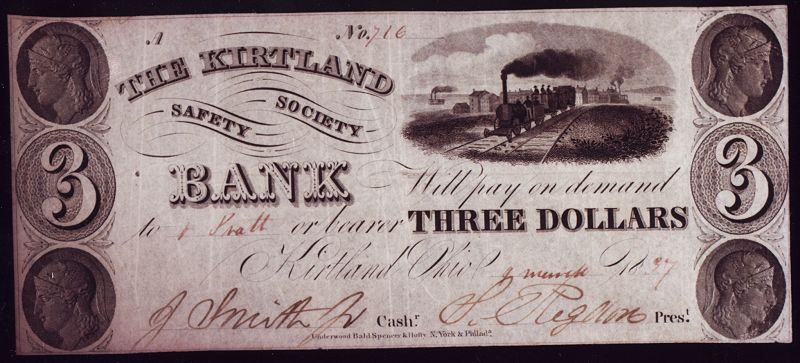why me wrote:JoetheClerk wrote:.
As for the Bank fraud. If God commanded it and the people followed it one would think it would prosper. It failed because it was a shell game. A con game. Joseph and some fellow leaders made money off it and the followers got screwed. An honest man would pay back every penny rather than try to declare bankruptcy and hide his assets. In the banking fiasco Joseph Smith was nothing more than a typical con man running a pyramid scheme to benefit him and a few buddies.
Not so. Joseph Smith was no business man that is for sure. And he also lost money. I think that when he was murdered, he had 'two cents' in his pocket.
Is there no feature of Joseph Smith's life that you cannot put a positive spin on?
The man runs a bank, despite having no capital to speak of, and no experience. He tells his followers that their deity commands the bank to be formed, and guarantees its success:
Warren Parrish, who had been an officer in the bank and had apostatized from the Church, made this statement: "I have listened to him [i.e. Smith] with feelings of no ordinary kind, when he declared that the AUDIBLE VOICE OF GOD, INSTRUCTED HIM TO ESTABLISH A BANKING-ANTI BANKING INSTITUTION, who like Aaron's rod SHALL SWALLOW UP ALL OTHER BANKS (the Bank of Monroe excepted,) and grow and flourish and spread from the rivers to the ends of the earth, and survive when all others should be laid in ruins." (Painesville Republican, February 22, 1838, as quoted in Conflict at Kirtland, page 297)
Wilford Woodruff, who remained true to the Church and became the fourth President, confirmed the fact that Joseph Smith claimed to have a revelation concerning the bank. Under the date of January 6, 1837, he recorded the following in his journal: "I also herd [sic] President Joseph Smith, jr., declare in the presence of F. Williams, D. Whitmer, S. Smith, W. Parrish, and others in the Deposit office that HE HAD RECEIVED THAT MORNING THE WORD OF THE LORD UPON THE SUBJECT OF THE KIRTLAND SAFETY SOCIETY. He was alone in a room by himself and he had not only [heard] the voice of the Spirit upon the Subject but even an AUDIBLE VOICE. He did not tell us at that time what the Lord said upon the subject but remarked that if we would give heed to the commandments the Lord had given this morning all would be well." ("Wilford Woodruff's Journal," January 6, 1837, as quoted in Conflict at Kirtland, page 296)
http://www.utlm.org/onlineresources/jos ... hsbank.htmHe goes ahead with the plan despite being refused a banking licence, and even signs the notes himself:

Of course the "anti-bank" goes bust, and lots of people lose their money. Now by any standards Smith was reckless and irresponsible in what he did. Assuming that we can eliminate the possibility that his deity actually existed, but lied to him, it is clear that either Smith was lying about the revelations he referred to, or was in a state of mental delusion. It is a disaster all round, for Smith certainly, but much more for those who lost their money on a grand scale.
Yet you dismiss this as if the whole sordid mess is just another sign of how innocent and unwordly Smith was, rather than seeing him (like 99% of non-LDS readers of the story, I would bet) as a fraudster who failed.
I repeat: is there no feature of Joseph Smith's life that you cannot put a positive spin on?

